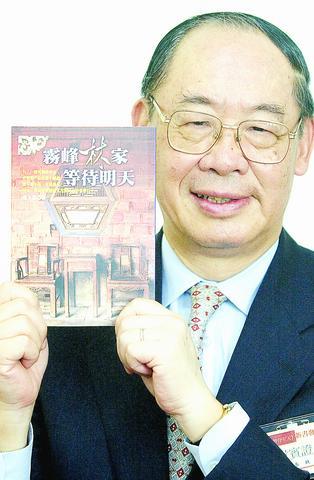Thanks to the Control Yuan's efforts, the 200-year-old Lin Family Gardens will have the chance to be reborn after being almost completely destroyed in the 921 earthquake, academics said yesterday.
A new book by Liu Yung-yi (

PHOTO: SEAN CHAO, TAIPEI TIMES
The book is based on an investigation by the Control Yuan, and tells the story of the legendary Lin family, how their old homestead in Taichung County was damaged by the quake, how the government abandoned the compound and even tried to delist it as a historical site.
The Lin family compound was built in 1858 and consists of 10 areas, including the main compound, pavilions, towers, cottages and gardens. The compound takes up more than 11,000m2.
"The Lin family compound is the encyclopedia of Taiwanese traditional architecture," said Lee Chien-lang (
"It is also the largest compound owned by one clan in Taiwan. It has no counterparts," Lee said.
The Lin Family Gardens were designated a national historical site in 1985. The buildings and gardens were reduced to rubble by an earthquake on Sept. 21, 1999.
According to the book, reconstruction of the compound and gardens were repeatedly delayed, losing both direction and momentum as the project became ensnared in bureaucratic red tape.
Last year, the Ministry of the Interior decided to remove a large part of the compound from the list of historical sites.
Huang Huang-hsiung (黃煌雄) and Ma Yi-kung (馬以工), two members of the government watchdog agency, the Control Yuan, began an investigation into the fate of the compound after receiving a petition from a Lin descendant last year.
"The ministry's policy on the [compound's] reconstruction was shaky and distrusted by people concerned," Huang said.
"When we warned them the first time, they reacted passively and there were even kickbacks from the ministry," he said.
The Control Yuan's efforts to push the ministry have finally paid off. The ministry has allocated a NT$650 million budget to overhaul the buildings and other structures; it also formed an ad hoc committee to supervise and accelerate the reconstruction process.
"We want to thank the Control Yuan, Mr. Huang and Ms. Ma," said Hsia Chu-joe (
As a large family once prominent in Taiwan's history, the Lin family's legends are as attractive as the compound they built, Liu said.
"Take Lin Wen-cha (林文察) for example. A thug in his youth, he later became the governor of Fujian Province's army and navy for the Qing Dynasty. Then he was burned to death after being captured by the troops of the Taiping Rebellion. Wasn't his life dramatic?" Liu said.
If the Lin family story was turned into a TV drama, "it would draw the best ratings," Liu said.
"I once told Ministry of Interior officials that China was trying to adapt the Lin family history for a TV drama series," Huang said.
"If such a story was broadcast one day in China and the family's compound had totally disappeared in Taiwan? there would be nothing more ironic than that," Huang said.

A strong continental cold air mass is to bring pollutants to Taiwan from tomorrow, the Ministry of Environment said today, as it issued an “orange” air quality alert for most of the country. All of Taiwan except for Hualien and Taitung counties is to be under an “orange” air quality alert tomorrow, indicating air quality that is unhealthy for sensitive groups. In China, areas from Shandong to Shanghai have been enveloped in haze since Saturday, the ministry said in a news release. Yesterday, hourly concentrations of PM2.5 in these areas ranged from 65 to 160 micrograms per cubic meter (mg/m³), and pollutants were

Taiwan’s armed forces have established response protocols for a wide range of sudden contingencies, including the “Wan Chun Plan” to protect the head of state, the Ministry of Defense (MND) said today. After US President Donald Trump on Saturday launched a series of airstrikes in Venezuela and kidnapped Venezuelan President Nicolas Maduro, concerns have been raised as to whether China would launch a similar “decapitation strike” on Taiwan. The armed forces regularly coordinate with relevant agencies and practice drills to ensure preparedness for a wide range of scenarios, Vice Minister of National Defense Hsu Szu-chien (徐斯儉) told reporters before a

EVA Airways on Saturday said that it had suspended a pilot and opened an investigation after he allegedly lost his temper and punched the first officer several times as their plane was taxiing before takeoff at Los Angeles International Airport. According to a report published on Thursday by The Reporter, the incident occurred after the flight’s Malaysian first officer tried to warn the Taiwanese pilot, surnamed Wen (文), that he was taxiing faster than the speed limit of 30 knots (55.6kph). After alerting the pilot several times without response, the first officer manually applied the brakes in accordance with standard operating

Japanese Councilor Hei Seki (石平) on Wednesday said that he plans to visit Taiwan, saying that would “prove that Taiwan is an independent country and does not belong to China.” Seki, a member of the Japan Innovation Party, was born in Chengdu in China’s Sichuan Province and became a naturalized Japanese in 2007. He was elected to the House of Concilors last year. His views on the Chinese Communist Party (CCP) — espoused in a series of books on politics and history — prompted Beijing to sanction him, including barring Seki from traveling to China. Seki wrote on X that he intends